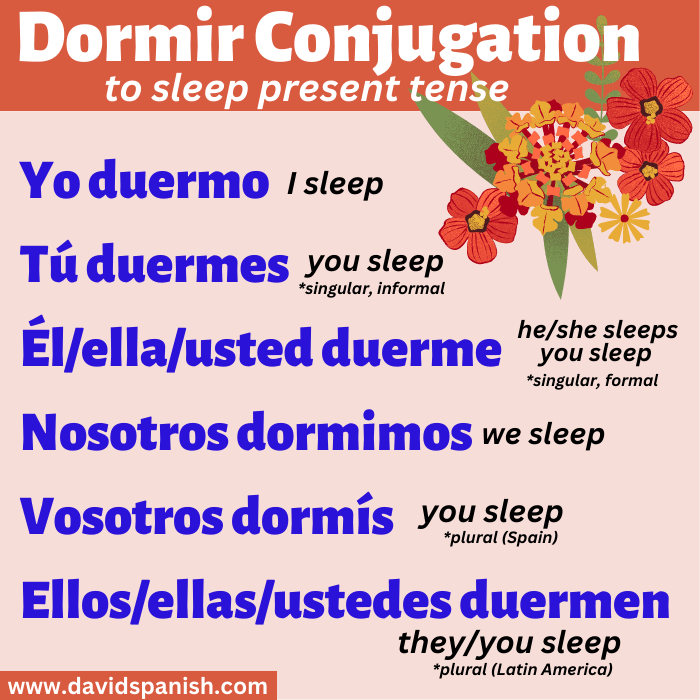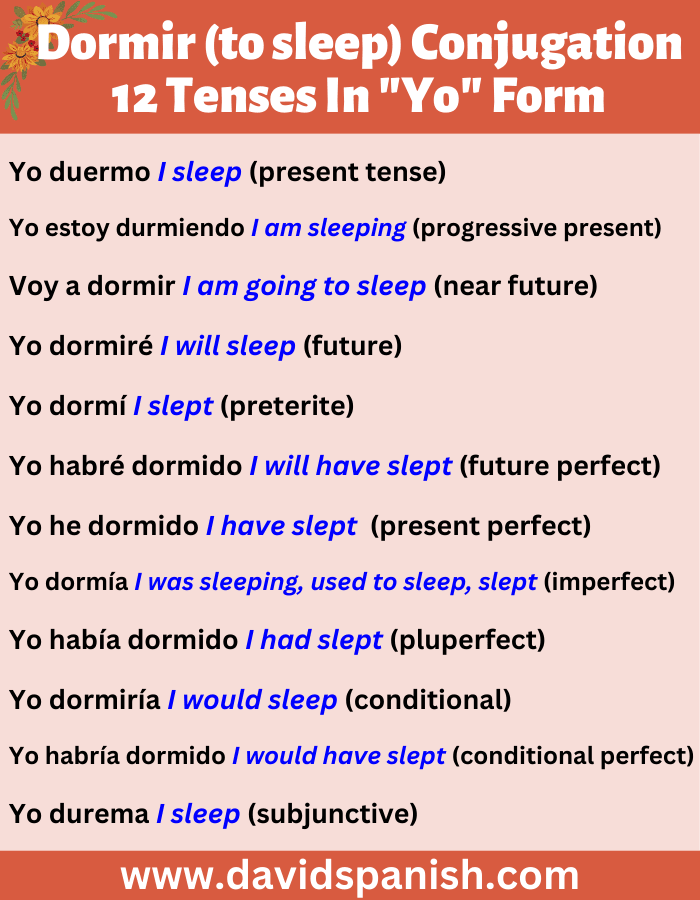Dormir (Meaning: to sleep in Spanish) is a an essential verb for all students. The conjugation of dormir in the present tense is: Yo duermo (I sleep), tú duermes (you sleep), él/ella, usted duerme (he/she sleeps, you sleep), nosotros dormimos (we sleep), vosotros dormís (you sleep) and ellos/ellas/ustedes duermen (they/you sleep).

Dormir is an irregular IR verb. This is because while its endings are the same as all other regular IR verbs when conjugated in the present tense, its stem changes. This page on our site covers regular and irregular Spanish IR verbs in detail.
Conjugation of dormir in the present tense

Further down the page we provide complete conjugation charts with example sentences for dormir in the following commonly used verb tenses:
- Present tense (presente de indicativo)
- Progressive present (presente progresivo)
- Near future (futuro inmediato)
- Future tense (futuro)
- Preterite (pretérito)
- Present perfect indicative (perfecto de indicativo)
- Imperfect (imperfecto de indicativo)
- Conditional (potential simple)
- Present subjunctive (presente de subjuntivo)
- Imperative (imperativo)
Dormir conjugation table

The following graphic show conjugations for dormir in the first-person singular (yo) form in twelve tenses.

Dormir conjugation charts
Present tense (presente de indicativo)
In the present tense, yo duermo translates to “I sleep” and “I am sleeping”.
| yo duermo | I sleep | Duermo en mi cama. | I sleep in a bed. |
| tú duermes | you sleep | Duermes en el salón. | You sleep in the living room. |
| él/ella, usted duerme | he/she sleeps, you sleep | Duerme con la puerta cerrada. | He sleeps with the door closed. |
| nosotros dormimos | we sleep | Dormimos hasta las once. | We sleep until 11 o'clock. |
| vosotros dormís | you sleep | Dormís en la tienda de campaña. | You sleep in the tent. |
| ellos/ellas, ustedes duermen | you/they sleep | Duermen en un cuarto de hotel. | They sleep in a hotel room. |
Progressive present (presente progresivo)
The progressive present combines the present tense of estar (to be) with the present participle. Yo estoy durmiendo translates to “I am sleeping”.
| yo estoy durmiendo | I am sleeping | Estoy durmiendo en mi habitación. | I'm sleeping in my bedroom. |
| tú estás durmiendo | you are sleeping | ¡Estás durmiendo demasiado! | You're sleeping too much! |
| él/ella, usted está durmiendo | he/she is sleeping, you are sleeping | Está durmiendo en la casa de su hermano. | He's sleeping at his brother's house. |
| nosotros estamos durmiendo | we are sleeping | Estamos durmiendo en la troca. | We're sleeping in the truck. |
| vosotros estáis durmiendo | you are sleeping | Estáis durmiendo en la playa. | You're sleeping on the beach. |
| ellos/ellas, ustedes están durmiendo | they/you are sleeping | Están durmiendo en un colchón de agua. | They're sleeping on a waterbed. |
Near future (futuro inmediato)
The near future tense combines the present tense of ir (to go) with the preposition a and an infinitive. Yo voy a dormir translates to “I am going to sleep”.
| voy a dormir | I am going to sleep | Voy a dormir en mi cama. | I'm going to sleep in my bed. |
| vas a dormir | you are going to sleep | Vas a dormir con tu peluche. | You're going to sleep with your stuffed animal. |
| él/ella, usted va a dormir | he/she is going to sleep, you are going to sleep | Va a dormir en una hamaca. | He's going to sleep in a hammock. |
| nosotros vamos a dormir | we are going to sleep | Vamos a dormir en este cuarto. | We're going to sleep in this room. |
| vosotros vais a dormir | you are going to sleep | Vais a dormir en una pensión. | You're going to sleep in an inn. |
| ellos/ellas, ustedes van a dormir | they/you are going to sleep | Van a dormir con la puerta abierta. | They're going to sleep with the door open. |
Preterite (pretérito)
The preterite tense is used to express past actions which occurred at specified times. Yo dormí translates to “I slept”.
| yo dormí | I slept | Dormí bien ayer por la noche. | I slept well last night. |
| tú dormiste | you slept | ¿Dormiste bien en esta cama? | Did you sleep well in the bed? |
| él/ella, usted durmió | he/she/you slept | Durmió en una carpa verde. | He slept in a green tent. |
| nosotros dormimos | we slept | Dormimos bajo las estrellas. | We slept under the stars. |
| vosotros dormisteis | you slept | Dormisteis en nuestra posada. | You slept in our inn. |
| ellos/ellas, ustedes durmieron | they/you slept | No durmieron en su casa. | They didn't sleep in their house. |
Present perfect indicative (perfecto de indicativo)
The present perfect indicative tense is used to describe past events which have a bearing on the present. Yo he dormido translates to “I have slept”.
| yo he dormido | I have slept | No he dormido bien. | I haven't slept well. |
| tú has dormido | you have slept | ¿Has dormido toda la noche? | Have you slept all night? |
| él/ella, usted ha dormido | he/she has slept, you have slept | Ha dormido en un hotel esta semana. | He's slept in a hotel this week. |
| nosotros hemos dormido | we have slept | Hemos dormido en esta cama. | We've slept in this bed. |
| vosotros habéis dormido | you have slept | ¿Habéis dormido en este centro turístico? | Have you slept in this resort? |
| ellos/ellas, ustedes han dormido | you/they have slept | Han dormido en la casda de sus abuelos. | They've slept at their grandparents' house. |
Imperfect (imperfecto de indicativo)
The imperfect tense is used to express past actions which occurred at unspecified times. Yo dormía translates to “I was sleeping”, “I used to sleep” and “I slept”.
| yo dormía | I was sleeping (or used to sleep, slept) | Yo dormía cuando llegaste. | I was sleeping when you arrived. |
| tú dormías | you were sleeping | Dormías cuando el teléfono sonó. | You were sleeping when the phone rang. |
| él/ella, usted dormía | he/she was sleeping, you were sleeping | Dormía bien cuando era niño. | He used to sleep well when he was a child. |
| nosotros dormíamos | we were sleeping | Dormíamos hasta mediodía. | We used to sleep until noon. |
| vosotros dormíais | you were sleeping | Dormíais cuando llegó la tormenta. | You were sleeping when the storm arrived. |
| ellos/ellas, ustedes dormían | they/you were sleepign | Dormían en su carpa cada verano. | They used to sleep in their tent every summer. |
Conditional (potential simple)
The conditional tense is used to express hypothetical actions. Yo dormiría translates to “I would sleep”.
| yo dormiría | I would sleep | Dormiría pero no estoy cansado. | I would sleep but I'm not not tired. |
| tú dormirías | you would sleep | ¿Dormirías si estuvieses cansado? | Would you sleep if you were tired? |
| él/ella, usted dormiría | he/she/you would sleep | Ella dormiría si tuviese una cama. | She's sleep if he had a bed. |
| nosotros dormiríamos | we would sleep | Dormiríamos hasta las diez si fuese posible. | We'd sleep until 10 o'clock if it were possible. |
| vosotros dormiríais | you would sleep | ¿Dónde dormiríais si tuvieseis una reservación? | Where would you sleep if you had a reservation? |
| ellos/ellas, ustedes dormirían | they/you would sleep | Dormirían en un centro turístico estuviesen de vacaciones. | They'd sleep in a hotel if they were on vacation. |
Present subjunctive (presente de subjuntivo)
The subjunctive is used to express wishes, emotions and doubts. Yo durema translates to “I sleep”.
| yo duerma | I sleep | Es importante que durema en me propria cama. | It's important that I sleep in my own bed. |
| tú duermas | you sleep | Quiere que duermas un poco más. | I want you to sleep a bit more. |
| él/ella, usted duerma | he/she sleeps, you sleep | No sé si duerma bastante. | I don't know if he's sleeping enough. |
| nosotros durmamos | we sleep | No piensa que durmamos en esta cama. | He doesn't think we're sleeping in this bed. |
| vosotros durmáis | you sleep | Quieren que durmáis en esta habitación. | They want you to sleep in this bedroom. |
| ellos/ellas, ustedes duerman | they/you sleep | No sé donde duerman esta noche. | I don't know where you're sleeping tonight. |
Imperative (imperativo)
The imperative mood is used to give commands and makes suggestions. Example sentences are under the chart.
| (tú) ¡duerme! | Sleep! | ¡no duermas! | Don't sleep! |
| (usted) ¡duerma! | Sleep! | ¡no duerma! | Don't sleep! |
| (nosotras) ¡durmamos! | Let's sleep | ¡no durmamos! | Let's not sleep! |
| (vosotras) ¡dormid! | Sleep! | ¡no durmáis! | Don't sleep! |
| (ustedes) ¡duerman! | Sleep! | ¡no duerman! | Don't sleep! |
- ¡Durmamos en esta cama! Let’s sleep in this bed!
- ¡Duerma con la puerta cerrada! Sleep with the door closed!
- ¡No duermas hasta mediodía! Don’t sleep until noon!
- ¡No duermas en mi cama! Don’t sleep in my bed!
Discover more:
- Hablar Conjugation: How To Conjugate “To Speak” In Spanish
- Querer Conjugation: How To Conjugate To Want In Spanish
- Poder Conjugation: How to Conjugate Can, Be Able In Spanish
- Tener Conjugation: How To Conjugate “To Have” In Spanish
- La Bamba Meaning, Spanish Lyrics & English Translation - May 4, 2024
- Bésame Mucho Meaning, Spanish Lyrics & English Translation - May 3, 2024
- Querida – Lyrics, Meaning & Translation - May 2, 2024
